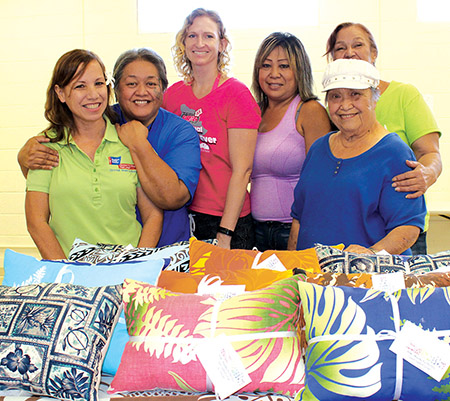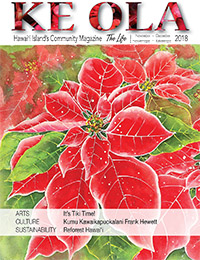
Hui Mālama Ola Nā ‘Ōiwi: Live Longer and Feel Better Together

By Paula Thomas
Hui Mālama Ola Nā ‘Ōiwi has been providing health and education services to the residents of Hawai‘i Island since 1991, following the Native Hawaiian Health Care Improvement Act that was passed in Congress in 1988. The Act was the first legislation passed that provided health care funding for indigenous peoples outside of the Native American Indian Act. Senator Daniel K. Inouye advocated for this bill and the appropriations funded five health care organizations around the state to support increased access to health care as well as health education.
From the outset, Hui Mālama Ola Nā ‘Ōiwi’s focus was on diabetes and hypertension—two rampant chronic diseases afflicting the Native Hawaiian population—as well as healthy eating. Edna Nicol Baldado, RN, was among the first employees.

“From the beginning we would talk about eating healthy, but no one knew what that meant. So we had to explain in sensible terms related to: how often do you eat? How much do you eat? What do you eat? As we began to teach our classes, we came up with the idea of connecting the value of the food to its color, and teaching to eat the colors of the rainbow,” she says.
Hui Mālama’s ‘Mai Ka Mala ‘Ai’ (Return to the Garden) was a program focused on how to grow, what to grow, why to eat it, making meals, and sharing recipes as a pathway to better health with diabetes.
“Nothing was very medical or intellectual,” Aunty Edna offers. “People needed really practical information and advice.” At first, no one would ask questions and Edna knew from her work at Hilo Medical Center, where she served for 28 years as a licensed practical nurse and an ICU nurse, that many people were simply not comfortable talking about their health issues publicly. Early on, she made home visits and worked one-on-one with patients and families. Hui Mālama offered van transportation to their facilities and Edna often drove. It was good private time to talk story.
Aunty Edna also taught groups of 25–30 people. During one session, she recalls an elderly woman who raised her hand and started off meekly with: “I have a stupid question.” Aunty Edna addressed this head on. “I told her there was no such thing as a stupid question. I said that if you come to this class and ask a question, it shows that you are smart.” When the woman asked her question, the audience began to stir because many others had the same concern. This broke the ice. People started talking more and asking for support.
It didn’t take long before the Mai Ka Mala ‘Ai program enabled some big shifts. People felt less skeptical, less concerned about being attended to because of their ethnicity, and no longer felt ill-informed. Doctors who came to speak realized that patients were hungry for information and so shared more—even with their office patients. At the start of every session, clients had their height, weight, and blood pressure obtained. Blood glucose was measured at the start, middle and end. By the end of the program, Hui Mālama’s clients were seeing changes in their health.
“We realized that patients didn’t feel that medical information was user-friendly. We set a new tone,” says Aunty Edna. “As we shared more and our clients asked more questions, the patient/doctor relationships started to change. We were supporting education and helping people to help themselves. It wasn’t about making demands on people or pushing things on them, but rather just to help them.”
This was all happening in a climate of doctor shortages, few hospitals or clinics, and limited access to health care across the island, with transportation being a limiting factor for many. Soon, Hui Mālama’s program was affecting other programs across the state.

Times Are Changing
Today, Hui Mālama’s suite of educational offerings covers everything from diabetes and hypertension to prenatal care and exercise plus health assessments. The Mai Ka Mala ‘Ai program used to span 10 weeks. The Diabetes Management class now runs for three weekly two-and-a-half-hour. Participants learn about diabetes, nutrition, exercise, medication, and tools needed for continued management of self-health while living with diabetes. Classes are delivered by RNs and other professionals all across the island.

Hui Mālama is going mobile, having closed its Ka‘u, Kona, Waimea-Kohala, and Honoka‘a offices to free up resources for island-wide outreach. “We are able to go to the people and visit schools, hospitals, homes without being confined to one physical work space,” notes Jasmine LeFever, Director of Community Relations & Special Projects. “We can better meet the needs of the community. This is especially helpful with the size of our island.”
Hui Mālama is in a rebuilding phase that is led by Louis “Uncle Louie” Hao, Executive Director. This year Uncle Louie stepped down from the board of directors to run the organization. “We are going to reopen our medical services,” he says, “and we’re on track to bring in $1 for every $5 of federal funding we receive. We have to become sustainable.” His philosophy of management is founded in the Hawaiian word ‘ho‘iho‘i,’ which means to replenish, replace, restore, preserve, revive. “You cut one tree and plant two,” he says. “We cannot just rely on federal funds and offer everything for free because that is not sustainable.”
Hui Mālama is looking at funding models that remain totally affordable to clients, provide opportunities for billable services, and include programs that can generate income, like medical and behavioral health services. Billing through insurance companies and soliciting donations and contributions will continue as it is a nonprofit 501(c)3. Uncle Louie is exploring ways to expand already-existing initiatives that embrace traditional Hawaiian healing (lā‘au lapa‘au, ho‘oponopono, lomilomi hāhā, and lā‘au kāhea) and Western medicine in partnership with higher-educational institutions.

A former basketball player who cuts a six-foot-plus profile, Uncle Louie is passionate about having our islanders exercise and move more. He retired from the County of Maui in 1999, and he found retirement uncomfortably boring, so he went back to work and is applying his expertise in management, human resource development, sociology, and as a kupuna (elder) in his new position. “You gotta sweat, you gotta move, circulate the blood,” he says determinedly, “find an opportunity to use your body. It helps with the mind.” Uncle Louie suggests everyday activities like gardening, walking, mowing the lawn, or even tai chi. What does he do for exercise? “I do zumba,” he says, smiling.
At the present time, Hui Mālama’s classes are offered for free and clients simply need to register online or in person. The community can take advantage of diabetes, hypertension, and nutrition education, assessment, exercise programs, traditional health workshops, support groups, or all of the above as appropriate to their health needs and diagnoses.

Community Outreach and Ho‘iho‘i
Wanda Louis, RN and Community Health Coordinator, runs community programs and is passionate about her health education role. Her interactive sessions on hypertension include recipe modification, exercise lessons, and stress management.

The Mālama Nā Keiki Festival, (Care for the Children) is a signature event in the summer that celebrates children, mothers, and families. During the school year, Hui Mālama teaches healthy eating habits through stories, craft projects, interactive sessions, and games. Wanda sits with the children and talks about eating the colors of the rainbow and why that is important.
Keiki learn what color foods help which parts of the body, what kind of foods to choose at restaurants, and Kimo, a hand-made wooden display with rolling eyes, is used with a scale to show keiki what happens when calories you take in from food don’t match the calories you use up from physical activity. Everything is geared toward making the learning fun, interactive, and easy to understand.
“Of importance about our work and services is that we can fill the need for more thorough education. Doctors try to educate patients during visits but time with patients is limited so they’ll refer to programs like ours. Making healthy changes takes time and ongoing support, and we provide the education and interactive support to help people make healthier lifestyle choices,” adds Jasmine.
In a continuing effort to meet the needs of the community, Hui Mālama introduced a new class this year: Healthy at Any Size, a six-week class that addresses hunger, fullness, body image, and fun ways to move and nurture body and soul. Makahiki Games, an elementary school physical education competition, will be rolled out in the 2018–2109 school year thanks to a small grant.
The concept of ho‘iho‘i is sparking new ideas, new initiatives, and the preservation of what is working well, and innovation in response to the changing landscape in health care. Hui Mālama receives grants from local and national organizations, the Office of Hawaiian Affairs, and the County of Hawai‘i in addition to federal funds. The Health Resources & Services Administration and the County funded September’s Ladiesʻ Night Out, now in its eighteenth year: an annual, free, three-hour event held at the Afook-Chinen Auditorium that is a celebratory, health awareness, and pampering extravaganza for women 18 years of age or older.
With new initiatives in the works, Hui Mālama is on the move. Preserving its 27-year history with the principle of ho‘iho‘i guiding its future, Hui Mālama Ola Nā ‘Ōiwi will remain a landmark health care organization supporting health and wellness at any age, at any size. ❖

Photos courtesy of Hui Mālama Ola Nā ‘Ōiwi
For more information, go to: HMONO.org


